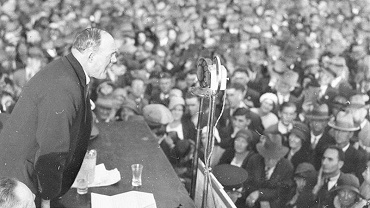The Australian Alert Service is the weekly publication of the Australian Citizens Party.
It will keep you updated on strategic events both in Australia, and worldwide, as well as the organising activities of the Citizens Party.
To subscribe to the Australian Alert Service, it's easy, and it's secure.
Lead Editorial
24 January 2024
Vol. 26 No. 4
Australia may well be a test case for the world as we stare down a bankers’ club which will do anything to save its collapsing system of control. The last time the City of London’s banking power was threatened—by national governments insisting they should control finance—World War I was sparked, and in its wake a new unquestionable doctrine of austerity (read, looting) was ushered in. Not only fiscal austerity, but monetary and industrial austerity. It was imposed under the spurious moral imperative of paying down debt to ensure a future, but in the countries where the population refused to accept the belt-tightening necessary to save the financial system—a.k.a. protecting financial stability— it was forced on them, with Fascism and Nazism being the extreme examples. (Documented in The genesis of austerity, available at citizensparty.org.au)
Australia itself narrowly avoided a fascist takeover by banker-funded paramilitary “citizens’ leagues” such as the New Guard, but only because the job was accomplished covertly, through control of banking. The Commonwealth Bank—which then acted as the nation’s central bank—was neutered and turned into an independent central bank on the model devised by Bank of England Chair Montagu Norman, who had conspired with other central bankers to establish a “private and eclectic central banks’ club” that would control global finance.
Australia, however, with Labor leaders such as King O’Malley, who had long fought the “Money Power” and showed the way for national banking in the early 1900s, and giants like Jack Lang who denounced austerity policy as the bidding of the “bloodsuckers of Britain”, did perhaps more than any other country to demonstrate an alternative approach. When World War II broke out, national credit was deployed to put people to work to build the country. It worked brilliantly, and because it was directed into the real economy, it was not inflationary. Knowing that the fight to protect such mechanisms, which ensured our sovereignty, was far from over, wartime Prime Ministers John Curtin and Ben Chifley fought to enshrine in legislation the government’s supremacy when it came to banking. Today, the Australian Treasurer, Jim Chalmers, is about to give away that power to rein in banking if and when necessary. This power has not been used since it was put into the banking legislation, but the mere suggestion of its use, by Senators from various parties in the face of the crisis over recent years, is threat enough.
Whenever Australian leaders have threatened to break from the straitjacket of City of London-Wall Street finance— seen in living colour with the Whitlam government—political hellfire has rained down. The entire neoliberal destruction of Australia’s economy was unleashed after Whitlam’s challenge, and the 1981 report of the Campbell Committee opened an era that painted government control of banking—indeed, of anything—as anathema to freedom and economic success.
The banking deregulation introduced by Campbell’s reforms included the central bank prioritisation of price stability (fighting inflation) and a shift away from encouraging full employment. This was specifically aimed at outlawing large government deficits, such as the Whitlam government’s 1974-75 budget, which raised government expenditure by 33 per cent. Treasurer Jim Cairns, a firm advocate of national banking principles, had described it as a budget “aimed directly at the economy to increase production, to get the economy going”. Any such intransigence had to be crushed. But until now, Curtin and Chifley’s Section 11, embedded in the Reserve Bank Act, which allows the government to override the central bank in the event of a dispute over policy, had been forgotten.
If Australia succeeds in keeping this democratic protection, it will be a shot heard around the world. Mobilise everyone you know to fight for this: let’s make our Old Labor leaders shake in their graves—in horror at what their party is giving away, and in pride at the new multi-party movement that is defending the treasure they bequeathed to us.
In this issue:
- Urgent: Australian Parliament must apply lessons from UK post office scandal to save Australia Post and licensees
- Australia, NZ financial reviews spell: IMF’d!
- The ghost of Julian Assange
- The myth of Milei: economic slavery pimped up as freedom
- Busting up the bankers’ club: new exposés
- Australia: A ‘rogue state’?
- Will Australians be complicit in genocide?
- US-backed separatists win Pyrrhic victory in Taiwan election
- Treasury will not have the final word!
- Review: Mr Bates vs the Post Office
- ALMANAC: The post office can do banking!
Click here to find out how to subscribe. For freely available AAS articles, click here.
Click here for the archive of previous issues of the Australian Alert Service








